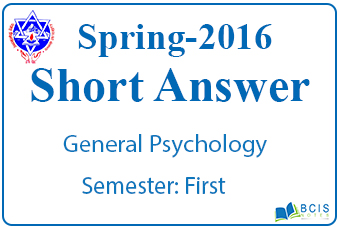
Very Short Questions Spring 2016
The answers to the Very Short Questions Spring 2016 are given below:
1. What do you mean by the case study method in psychology?
ANS- A case study is a detailed examination of an individual, a group of people or a particular occurrence. Case studies comprise of a one-on-one interview, questionnaires among other data collection forms.
2. Write down about creativity.
ANS- Creativity is defined by noted psychologist John R. Hayes as, “the potential of persons to produce creative works whether or not they have produced any work as yet.”
3. Write down the sensory threshold.
ANS- A sensory threshold is the level of strength a stimulus must reach to be detected. Psychologists study sensory thresholds to learn how humans and animals process sensory information.
4. What is the drive-in motivation?
ANS- Drive refers to increased arousal and internal motivation to reach a particular goal. Psychologists differentiate between primary and secondary drives. Primary drives are directly related to survival and include the need for food, water, and oxygen.
5. Introduce habituation and adaptation.
ANS- Habituation, or decreased behavioural response, to odours is created by repeated exposure and several detailed characteristics, whereas adaptation relates to the neural processes that constitute this decrease in a behavioural response.
6. How do biological factors determine psychological behaviour?
ANS- The biological perspective holds that a person’s behaviour and thought processes are a product of different biological factors such the genetic make-up, neurological brain and endocrinal functions as well as evolutionary functions.
7. Define cognitive learning.
ANS- Cognitive learning is a style of learning that focuses on more effective use of the brain. To understand the process of cognitive learning, it’s important to know the meaning of cognition. Cognition is the mental process of gaining knowledge and understanding through the senses, experience and thought.
8. Introduce the working memory.
ANS- Working memory is the site of awareness and thinking, where we hold information that is being actively processed by our mind. The working memory draws upon both the environment and long-term memory to process things. It is very small in capacity and, unlike long-term memory, its capacity cannot be changed.
9. What is the objective test of personality?
ANS- Objective Personality Tests The best known objective personality test is the MMPI. This test was created primarily to measure psychopathology. It contains several validity scales to determine if the client is responding to the questions accurately and truthfully, and it also contains ten basic clinical scales.
10. What is the psychoneuroimmunology of stress?
ANS- Psychoneuroimmunology is defined as the examination of the interactions among psychological, behavioural, and social factors with immunological and neuroendocrine outcomes. It is now well established that psychological factors, especially chronic stress, can lead to impairments in immune system functioning in both young and older adults.
You may also like Pokhara University || Spring,2016 || General Psychology

Leave a Reply